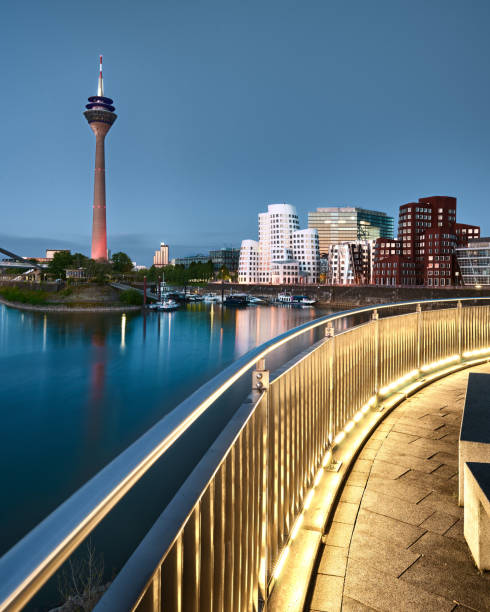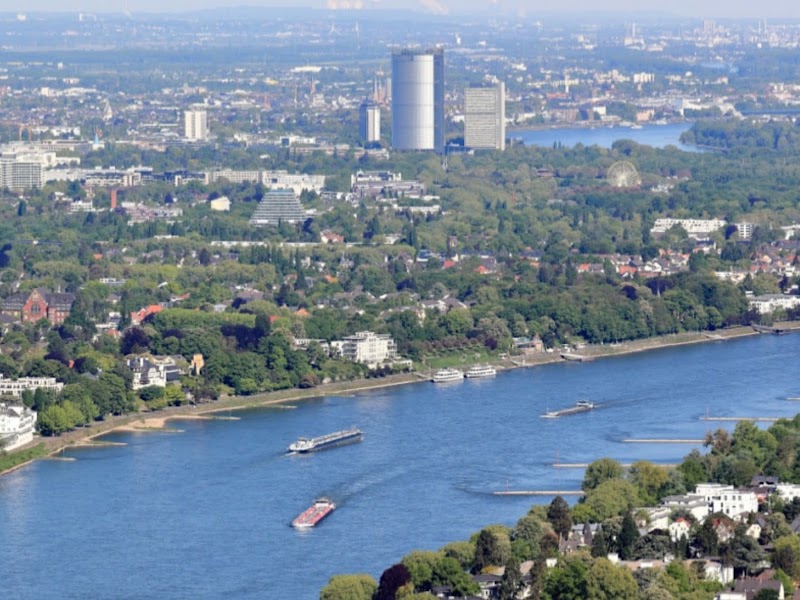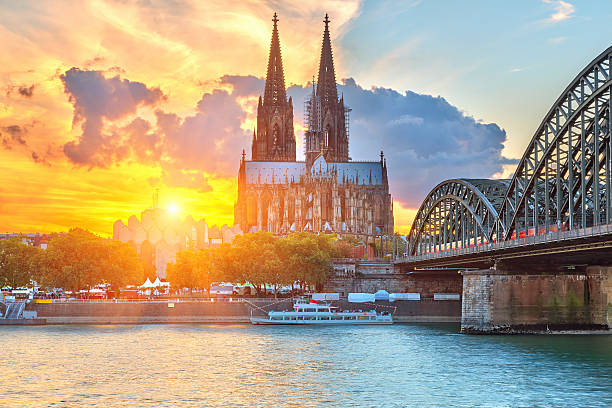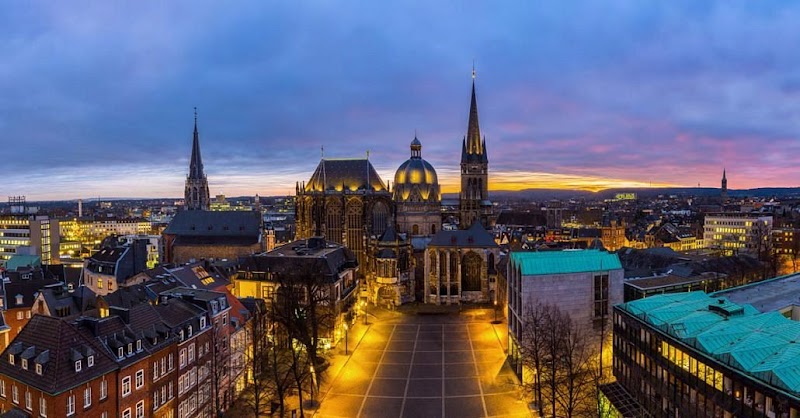Welcome to North Rhine-Westphalia
Did you know that North Rhine-Westphalia, the most populous state in Germany, is home to over 17.9 million people? Here, you'll find an intoxicating blend of urban hubs and picturesque landscapes, from the vibrant city of Cologne with its majestic cathedral, to the breathtaking heights of the Teutoburg Forest. North Rhine-Westphalia, a stage for mesmerizing history and unspoiled natural beauty, offers the curious traveler a treasure trove of experiences.
Every journey here begins with a well-planned itinerary, and our comprehensive tourist map of Germany is an indispensable tool to unlock the magic of North Rhine-Westphalia. It's more than just a guide—it's your companion, leading you to hidden gems and architectural masterpieces, and helping you navigate the beautiful chaos of this German state's enchanting cities and tranquil countryside.
" Booking.comExploring the Wonders of North Rhine-Westphalia
Looking for a vibrant touch of art, an encounter with history, or a dose of urban charm? North Rhine-Westphalia offers an alluring blend of rich experiences that make it a must-visit destination in Germany. As you uncover the gems of this region, you will find yourself on a captivating journey amidst stunning landscapes, architectural marvels, and delightful cultural heritage. So, let's dive into the wonders that await!
Top Attractions in North Rhine-Westphalia
- Düsseldorf's Old Town
- Münster Cathedral
- Zeche Zollverein
- Phantasialand Theme Park
- Aachen Cathedral
- Beethoven House, Bonn
- The Rhine River Promenade
Immerse in the Old World Charm: Düsseldorf's Old Town
The heart of Düsseldorf, the Old Town, is a delightful blend of historic charm and modern vibrancy. As you stroll through the cobblestone streets, you can't help but marvel at the centuries-old churches and traditional breweries, standing in harmony with hip boutiques and contemporary art galleries. Don't miss the chance to experience the famous 'Altbier', a unique style of beer that is a source of local pride. After all, they don’t call this area the 'longest bar in the world' for nothing!
The Spiritual Splendour: Münster Cathedral
Standing tall in the historic city of Münster, the Cathedral of St. Paul is a testament to the region's rich religious heritage and architectural prowess. The cathedral’s striking twin towers dominate the city skyline, while inside, the medieval astronomical clock, with its intricate mechanics and zodiac signs, leaves visitors in awe. A climb to the top rewards you with panoramic views of the city and the cathedral's old-world charm, making it a perfect spot in your journey through Germany.
Industrial Heritage Turned Cultural Icon: Zeche Zollverein
What was once the largest and most modern coal mine in the world, Zeche Zollverein in Essen is now a UNESCO World Heritage site that embodies the region's industrial past and its transformation into a vibrant cultural landscape. Today, it houses the Ruhr Museum, offering insights into the area’s nature, culture, and history. The Zollverein Coal Mine Industrial Complex is a stark reminder of the region's history and a symbol of its resilience.
Thrills and Chills: Phantasialand Theme Park
Ready for a rush of adrenaline? Phantasialand in Brühl is one of Europe's top theme parks, offering a perfect blend of thrilling rides, spectacular shows, and themed worlds. From the high-speed roller coasters of 'Black Mamba' and 'Taron' to the enchanting world of 'Mystery Castle', Phantasialand promises a fun-filled day for all ages.
Historic Grandeur: Aachen Cathedral
Aachen Cathedral is an architectural masterpiece that has stood the test of time, representing over a thousand years of European history. As the final resting place of Charlemagne, the first Holy Roman Emperor, and the coronation site of German kings, the cathedral holds immense historical significance. Its unique design, combining elements of Carolingian, Ottonian, and Gothic architecture, is a visual treat for history and architecture enthusiasts alike.
Homage to a Music Legend: Beethoven House, Bonn
There's no better way to understand the life and legacy of Ludwig van Beethoven than a visit to his birthplace, Beethoven House in Bonn. This historic house-turned-museum offers a deep dive into the composer's life, his music, and the era he lived in. Its extensive collection of original documents, instruments, and portraits provides a unique perspective on Beethoven's genius.
Stroll Along the Rhine: The Rhine River Promenade
For a relaxing end to a day full of exploration, take a leisurely stroll along the Rhine River Promenade in Düsseldorf. This bustling riverside walkway offers picturesque views of the city skyline, the iconic Rhine Tower, and the serene flow of the Rhine River. The promenade is lined with vibrant cafes and restaurants, making it a perfect spot to unwind and soak up the atmosphere of North Rhine-Westphalia. For more about the city, check our tourist map of Düsseldorf.

Practical Information for North Rhine-Westphalia
Transportation and Mobility
North Rhine-Westphalia boasts an efficient public transportation network, making it easy to navigate between cities and attractions. The region is served by Deutsche Bahn (DB), Germany's national railway. Regular Intercity-Express (ICE) and regional trains connect major cities like Düsseldorf, Cologne, and Dortmund. Single tickets start from €2.80 for short journeys, but for frequent travel, consider the day ticket starting at €30.00.
In urban areas, you can rely on trams and buses. Bike rentals are also popular, particularly in flat cities like Münster. And don't forget about the Rhine and Moselle river cruises for a scenic commute!
Schedules and Prices
Planning your visit ahead can help you make the most of your trip. Most museums, historical sites, and attractions in North Rhine-Westphalia are open from 10am to 5pm, Tuesday to Sunday. Some may extend their hours during the summer season. Entry fees generally range from €5 to €15, with discounts for students, seniors, and families.
Safety Tips
North Rhine-Westphalia is generally safe for travelers, but like anywhere else, common sense precautions should be taken. Be aware of your surroundings, especially in crowded tourist areas and late at night. It's also good to have travel insurance that covers healthcare costs, as medical services in Germany are expensive.
Practical Recommendations
For the best experience in North Rhine-Westphalia, timing is key. The region is beautiful year-round, but the best time to visit is from May to September when the weather is warm and the days are long. However, this is also the peak tourist season, so book your accommodation and tickets in advance.
Also, don't underestimate the size of North Rhine-Westphalia. It's the most populous state in Germany and has plenty to offer, so plan your itinerary carefully and allow ample time for each destination. For a broader perspective, check our tourist map of Rhineland.

Frequently Asked Questions about North Rhine-Westphalia
1. What unique gastronomic experiences can I find in North Rhine-Westphalia?
North Rhine-Westphalia offers a plethora of culinary delights that are unique to the region. From traditional dishes like Sauerbraten (pot roast) and Himmel un Ääd (black pudding with apples and potatoes) to the famous Altbier, a type of beer brewed in Düsseldorf, you will be spoilt for choice. Don't miss out on trying the iconic Westphalian ham, a regional specialty that boasts a distinctive smoky flavor.
2. I'm interested in the arts. What cultural festivals should I attend in North Rhine-Westphalia?
North Rhine-Westphalia is a cultural powerhouse with a vibrant arts scene. The Ruhrtriennale, an annual arts festival held in the Ruhr region, features a range of performances including theatre, visual arts, and music. You should also consider attending the world-renowned Düsseldorf Carnival, a week-long celebration filled with parades, balls, and lively street parties.
3. Can I take a vineyard tour in North Rhine-Westphalia?
Yes, North Rhine-Westphalia is home to some of Germany's most scenic vineyards. Particularly, the regions alongside the Rhine and Ahr rivers are known for their wine production. Many of these vineyards offer tours and tastings, allowing you to immerse yourself in the rich wine culture of the region.
4. Are there any eco-friendly travel options in North Rhine-Westphalia?
North Rhine-Westphalia boasts numerous eco-friendly travel options. You can explore the region's stunning landscapes via a network of cycle paths and hiking trails. Furthermore, the local public transportation is highly efficient and a greener alternative to driving. Additionally, numerous hotels in the region adhere to sustainable practices, minimizing their environmental impact.
5. What are some lesser-known attractions in North Rhine-Westphalia?
North Rhine-Westphalia is brimming with hidden gems waiting to be discovered. You might enjoy a visit to the Zons Medieval Fortress, a well-preserved medieval town on the Rhine River. Or, explore the picturesque hills and charming villages of the Sauerland region, which is often overlooked by tourists.
6. I am a student. Are there discounts available for attractions in North Rhine-Westphalia?
Yes, many attractions in North Rhine-Westphalia offer discounted rates for students. Be sure to carry your student ID with you. Additionally, the state offers a "SchönerTagTicket NRW" which allows unlimited travel on local buses and trains at a reduced price for students.


